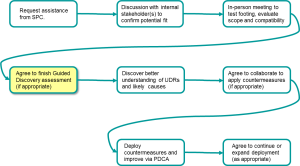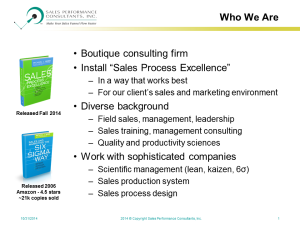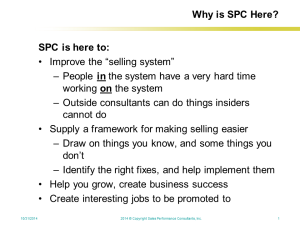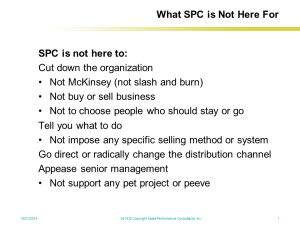Guided Discovery Kick-Off Workshop
Step-by-Step Instructions for Getting Started on A Solid Footing
Audience: Executive Sponsors, Team Leaders, and Core Team members
Objective: After taking this course you will:
- Understand the purpose of your company’s initiative, and the method for achieving it
- Understand your role in the project, and how you can best contribute
- Be clear on the first action items needed for launching the work successfully.
Formats: HTML, PDF,
(Javascript is required to view the course below.)
[accordion][title]Guided Discovery Kickoff Overview[/title] [details]Being asked to work on a special project can be a wonderful opportunity, so long as the purpose of the work is clear, its goals are achievable, and the work is consistent with your ambitions and interests.
When ever an outside consultant is invited, people inside the business have concerns and curiosity. This workshop will answer your questions, and help to position you to have the most powerful effect possible on the outcome of this project.
My name is Michael Webb, and I’ll be assisting you through these discussions. This discussion should take from 60 to 90 minutes. A copy of the PowerPoint slides we will use is here.
Other attendees are:
How Did This Project Come About?
SPC is well published in the area of Sales Process Excellence. Someone on your management team contacted SPC to see if there was a potential fit between our two companies.
These are the topics we will cover:
- What is the Purpose of this Work?
- Who is SPC?
- Why Are We Doing This?
- Why is SPC Here?
- What Do We Want to Avoid Doing?
- What SPC Is NOT Here For
- Information Needed
- Improvement Team Roles
- Next Steps?
Help us understand what is the purpose of this work, from your point of view?
Everyone brings a unique background to projects like this.
- What is your understanding of the long range goal?
- What would this look like?
- What would be different from today?
- What changes might make this possible?
- What do we want to avoid?
- When the project is finished, what will be different about the business?
++++
Insert pop-up dialog here:
Some reasons other companies have done this:
- Enable us to achieve growth initiatives
- Streamline the work we do every day (create to do + not to do)
- Create (the right) structure, measurement, and discipline (we do not have this in our business today)
- Do a better job listening to the voice of the customers
- Identifying (with numbers) the value we add to the customer
- Identifying the right things we need to do to enable us to make OUR numbers)
- Communicate and lead the rest of the company, this is the way we need to do things from now on.
++++
Here is an example of a positioning statement. How well does this fit your environment?
[/details] [title]Who is SPC?[/title] [details]SPC, Inc., is a boutique consulting firm, founded by Michael Webb in 2002.
As a salesperson and sales manager, he wanted out of the rat race of things one buys, ads, and collateral no one reads, trade shows, promotions, “leads,” and proposal labor wasted, and prospects and customers who don’t recognize your value.
He believed sales and marketing should be a system designed so the CUSTOMER will follow it.
That sales is not something you do to customers, it is something you do with them, and for them. Everything that enables the right customer actions creates value. Anything else is waste.
Businesses require a shared understanding of how that system works. That knowledge is based on evidence and data around customer actions and responses – not the opinion of some VP or outside consultant. Knowledge of the system is what enables companies to determine which changes will create improvement. SPC stands for this production system approach to sales and marketing. It is a far better way of managing than traditional sales and marketing approaches.
Lean, six sigma, and process excellence merely provide the “how to” methods that define and improve the system. The result is a fully developed methodology you can read about on your own in Sales Process Excellence. Or, you can collaborate with us to help you achieve your goals.
Companies who chose to work with us are typically very forward thinking organizations.
[/details] [title]Why Are We Doing This?[/title] [details]In your view, why is your company interested in doing this work?
There can be many reasons. For example,
- Why are we doing this now?
- Why are we doing this in this manner?
- What is different about the approach we are taking?
- Why do we think we can succeed?
- What improvement do we think we can create?
++++
Insert pop-up dialog here:
Some reasons other companies were interested in doing this work now, in this manner:
- We need to move fast, because there is growth in the market we are not taking advantage of, and competitors are encroaching
- There is inefficiency in our sales and account management process, the resources we use to acquire customers.
- We need a way to define and measure which product developments, accounts, and sales opportunities are the right ones for us to pursue.
- Identify best practices that we can transfer to our channel partners (such as better education for distributors)
- New salespeople (and distributors) currently take as much as 18 months to come up to speed. We need to reduce that, so new people can be productive much more quickly.
- People have been trained on sizing and configuring traditional equipment (simple, like under the hood of an old Chevy). New applications are much more sophisticated and complicated (like under the hood of a new Mercedes).
++++
[/details] [title]Why is SPC Here?[/title] [details]SPC brings special background and expertise for companies who want to improve using process excellence methods.
SPC does not work like most outside consulting firms, such as sales training or CRM firms. We work collaboratively.
This means YOU will be leading the work, and we will be assisting you. Our goal is to enable you to achieve the objectives of the project, so that you could do it again on your own, without our help.
[/details] [title]What Do We Want to Avoid Doing?[/title] [details]In your view, what would be something we should avoid doing as a result of this work?
Projects like this can sometimes have unintended consequences. For example:
- What is the most likely thing to go wrong?
- What could possibly go wrong?
- What to we need to avoid?
- What are some outcomes we do not want?
++++
Insert pop-up dialog here:
Some outcomes results other companies have wanted to avoid:
- Need to come up with a way of keeping this simple when communicating with our peers.
- We need to be cognizant of how to guide people through the change curve (denial, resistance, exploration, commitment) as quickly and efficiently as possible.
- We DO NOT WANT TO SETTLE! We do not want to come out of this with nothing but a new sales presentation. We want this to have a real and major impact on the business.
++++
[/details] [title]What SPC Is NOT Here For[/title] [details]When consulting firms are hired, it can make employees nervous, and there is sometimes good reason for this. However, we are not here for those reasons.
We are accountable along with you to produce the desired business result. Our role is NOT to do the work for you. Our role is to provide you with the knowledge, skills, and coaching you need to achieve the goals yourself. Our experience is that this is the best way to maximize the transfer of knowledge.
Working with SPC on an engagement like this usually gives you better education and experience than a typical green belt – or even black belt – training program, because you will apply what you learn to real problems and see them through to completion.
[/details] [title]Information Needed[/title] [details]Together, we will need to gather a great deal of information to achieve the goals of this work. Here is an initial list of materials:
- Sales and marketing org chart
- Sales process slides & documentation
- Current performance against revenue and expense budgets
- Relevant upcoming events, opportunities, changes, or programs?
- Description or overview of existing reporting, accounting, CRM, or other business system software
Is there other information we have not asked for you think we will need?
[/details] [title]Improvement Team Roles[/title] [details]
For any project to be successful, people need to understand the roles that need to be accomplished, and who owns responsibility for those roles. Here is a description of roles in an SPE initiative:
Who in our project will be responsible for these roles:
- Sponsor:
- Team Leader:
- Facilitator:
- Core Team Members:
- Support Personnel:
[/details] [title]Next Steps?[/title] [details]
How will we work together?
- Regular calls
- Group/individual discussion
- Agenda and project plan
- Help each other accomplish the goal
Reading assignment:
Objective for our next meeting:
Questions and concerns?
What was the highlight of this meeting for you?
What could be improved in the next meeting?
[/details][/accordion]






